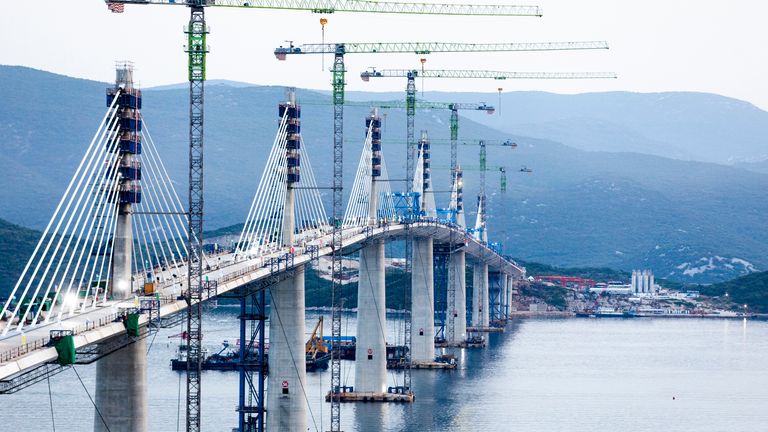Croatia celebrates construction of major bridge across Adriatic Sea – but Bosnian officials left angered
A major bridge has been built over the Adriatic Sea linking two swathes of Croatian coastline – in a move that has angered Bosnian officials who claim it violates its access to open waters.
Croatia had been aspiring to build a bridge to unite its territory for decades – as travellers between the two sections have faced border checkpoints as they cross into Bosnia before leaving again.
A midnight opening ceremony on the spectacular bridge featured folk dancers, singing and a huge fireworks display.
Croatian Prime Minister Andrej Plenkovic said during the ceremony that the bridge represents “a fascinating strategic accomplishment of the Croatian people and their state” that fulfils their long-time dream to have the Adriatic coastline connected.
The bridge and its connecting roads are expected to be completed by June of next year. Until then, road travellers wanting to visit some of Croatia’s most attractive tourist destinations, such as the Old Town section of Dubrovnik, will still have to pass through two border checkpoints between Bosnia and Croatia at the Bosnian seaside port of Neum.
Bosnian officials were not happy when the construction started, claiming the bridge that circumvents Bosnian territory violates the state’s sovereign access to open seas in the Adriatic.
Mr Plenkovic said the bridge will not divide, but it will connect people and nations.
He said: “The bridge does not connect only Croatia, but it connects the EU as well as Bosnia-Herzegovina.”
The China Road and Bridge Corporation won an international bid in 2018 to construct a 1.5 mile-long bridge. The construction is 85% financed by the EU and is a rare Chinese project in Europe that went through a regular bidding process.
In recent years, China has been pouring funds into Central and Eastern European countries as part of its strategic Belt and Road project, which includes upgrading infrastructure and is aimed at creating a network of transportation and trade links between China and Europe.
EU officials, however, worry that the Chinese investments boost the Asian country’s economic and political clout in the region, which is still reeling from the 1990s break-up of the former Yugoslavia.
Source: Read Full Article



